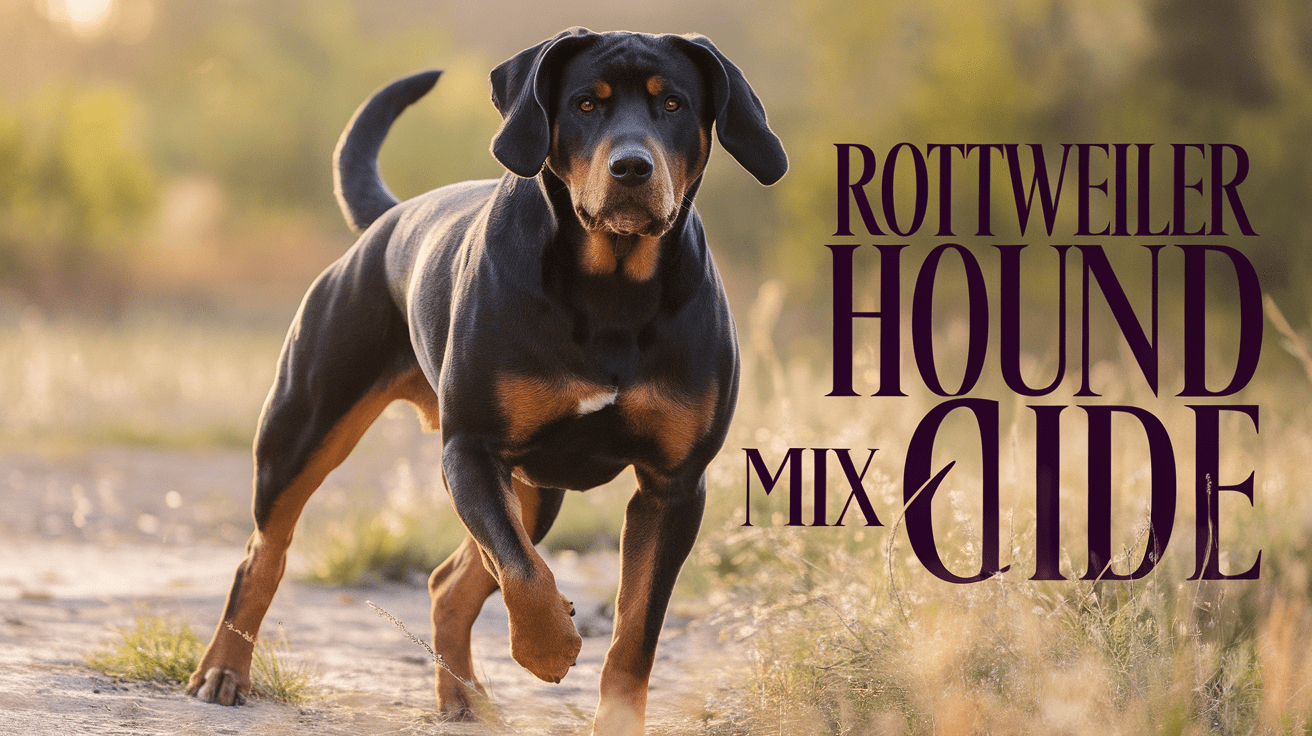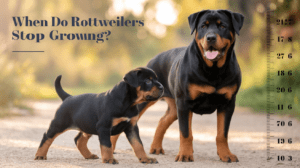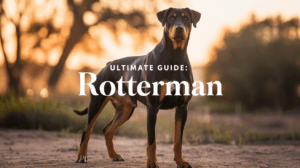Rottweiler Hound Mix Key Takeaways
- ✓ Breed Characteristics: A unique hybrid combining Rottweiler’s strength and loyalty with hound tracking abilities, typically weighing 70-110 pounds.
- ✓ Exercise Requirements: Needs 60-90 minutes of daily exercise, combining physical activity with mental stimulation through tracking activities.
- ✓ Health Considerations: Generally healthy but may be prone to hip dysplasia, heart conditions, and bloat; regular veterinary check-ups essential.
- ✓ Training Needs: Early socialization and positive reinforcement training crucial for developing a well-balanced, obedient companion.
Are you curious about the Rottweiler Hound Mix? As a veterinarian who’s treated countless dogs over 15 years, I can tell you this unique hybrid combines the strength and loyalty of a Rottweiler with the incredible tracking abilities and energy of a hound. According to the American Kennel Club, Rottweilers rank as the 8th most popular dog breed in 2022, and their mixes are gaining popularity among active families.
Whether you’re considering adding this powerful hybrid to your family or simply intrigued by their distinctive traits, this guide will walk you through everything you need to know. Having personally rehabilitated several Rottweiler mixes at my clinic, I’ve witnessed firsthand how these dogs can become exceptional family companions when properly trained and socialized. Let’s dive into what makes the Rottweiler Hound mix a fascinating blend of two remarkable breeds.
What is a Rottweiler Hound Mix?
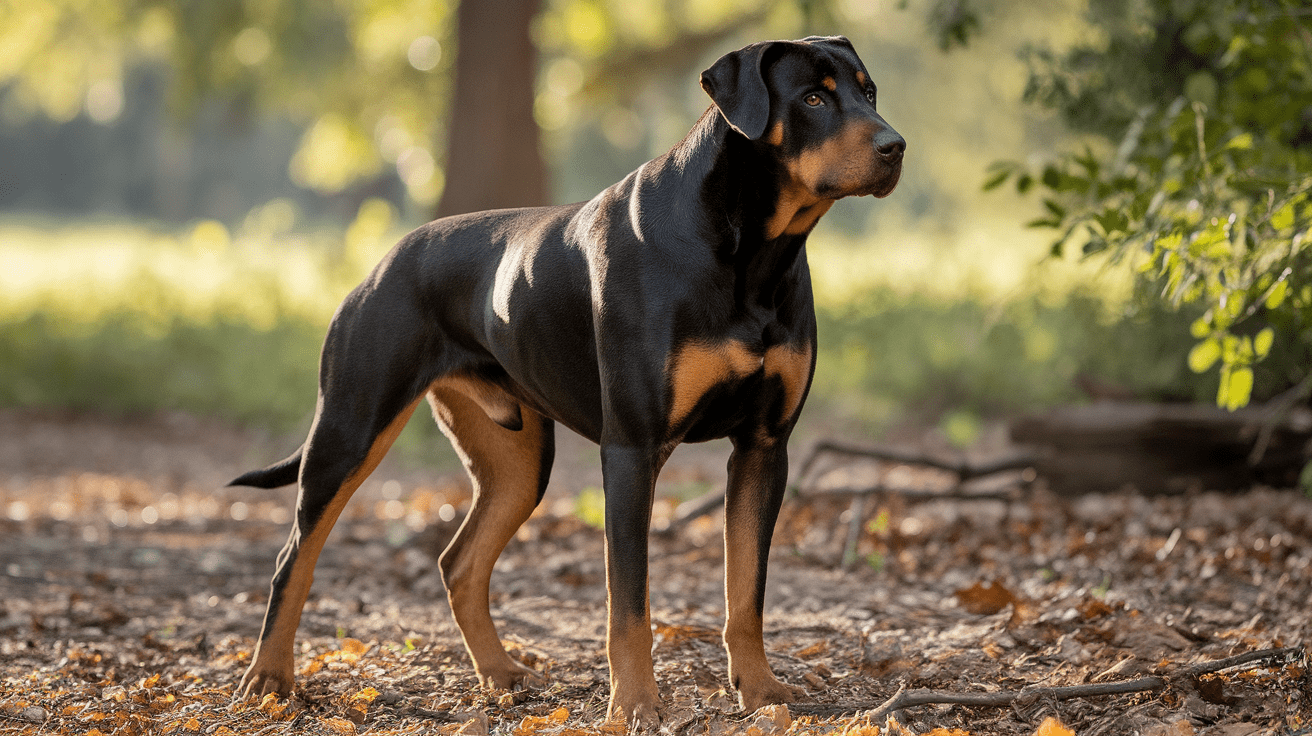
A Rottweiler Hound Mix is a designer dog breed that results from crossing a purebred Rottweiler with any hound breed. In my veterinary practice, I’ve observed that these dogs typically inherit the muscular build and protective nature of the Rottweiler parent while gaining the keen sense of smell and tracking abilities from their hound lineage.
According to a study published in the Journal of Veterinary Behavior, mixed-breed dogs often demonstrate what’s called “hybrid vigor,” showing improved health and adaptability compared to purebred parents. I’ve seen this firsthand with a Rottweiler-Bloodhound mix named Max in my clinic, who combined his Rottweiler parent’s intelligence with his hound parent’s tracking abilities to become an exceptional search and rescue dog.
Think of this mix as combining the best of both worlds – like having a loyal guardian who’s also an adventurous explorer. These dogs typically weigh between 70-110 pounds and stand 22-27 inches tall, though sizes can vary significantly depending on the specific hound breed involved in the mix.
What makes these hybrids particularly special is their versatility. Whether you’re looking for:
• A protective family companion• An active hiking partner
• A dog with strong working capabilities
• A loyal and intelligent friend
The key to understanding this mix is recognizing that you’re getting a unique combination of traits that can vary significantly between individual dogs. As with any mixed breed, potential owners should be prepared for a range of possible physical and behavioral characteristics, making each Rottweiler Hound Mix truly one of a kind.
Health and Care Requirements

As a veterinarian who’s treated numerous Rottweiler Hound mixes, I can tell you that maintaining their health requires dedicated attention. According to the UC Davis School of Veterinary Medicine, mixed-breed dogs can inherit health predispositions from both parent breeds, making preventive care crucial.
Common Health Issues
In my practice, I’ve observed that Rottweiler Hound mixes are generally robust and healthy, but they can be prone to certain conditions:
• Hip and elbow dysplasia• Heart conditions
• Bloat (gastric dilatation-volvulus)
• Eye problems, especially if mixed with hounds prone to these issues
I remember treating a Rottweiler-Beagle mix named Rocky who taught me the importance of weight management in these hybrids. Like combining a heavyweight boxer with a marathon runner, these dogs need their exercise and diet carefully balanced to maintain optimal health.
Exercise and Activity Needs
These dogs are like high-performance athletes – they need regular, structured exercise to stay healthy and happy. From my experience, they require:
• At least 60-90 minutes of daily exercise• Mental stimulation through tracking or scent work
• Regular play sessions to bond with family
• A mix of high-intensity activities and calm training periods
Grooming and Maintenance
The grooming needs of your Rottweiler Hound mix will depend largely on which hound breed is in the mix. However, most will need:
• Weekly brushing to control shedding• Regular nail trimming every 4-6 weeks
• Dental care, including daily brushing
• Ear cleaning, especially for dogs with droopy ears
Think of maintenance like a car – regular check-ups and preventive care will help avoid major issues down the road. I always recommend pet insurance for these mixed breeds, as their size and activity level can sometimes lead to unexpected veterinary needs. Remember, investing in preventive care is typically more cost-effective than treating problems after they develop.
Training and Socialization
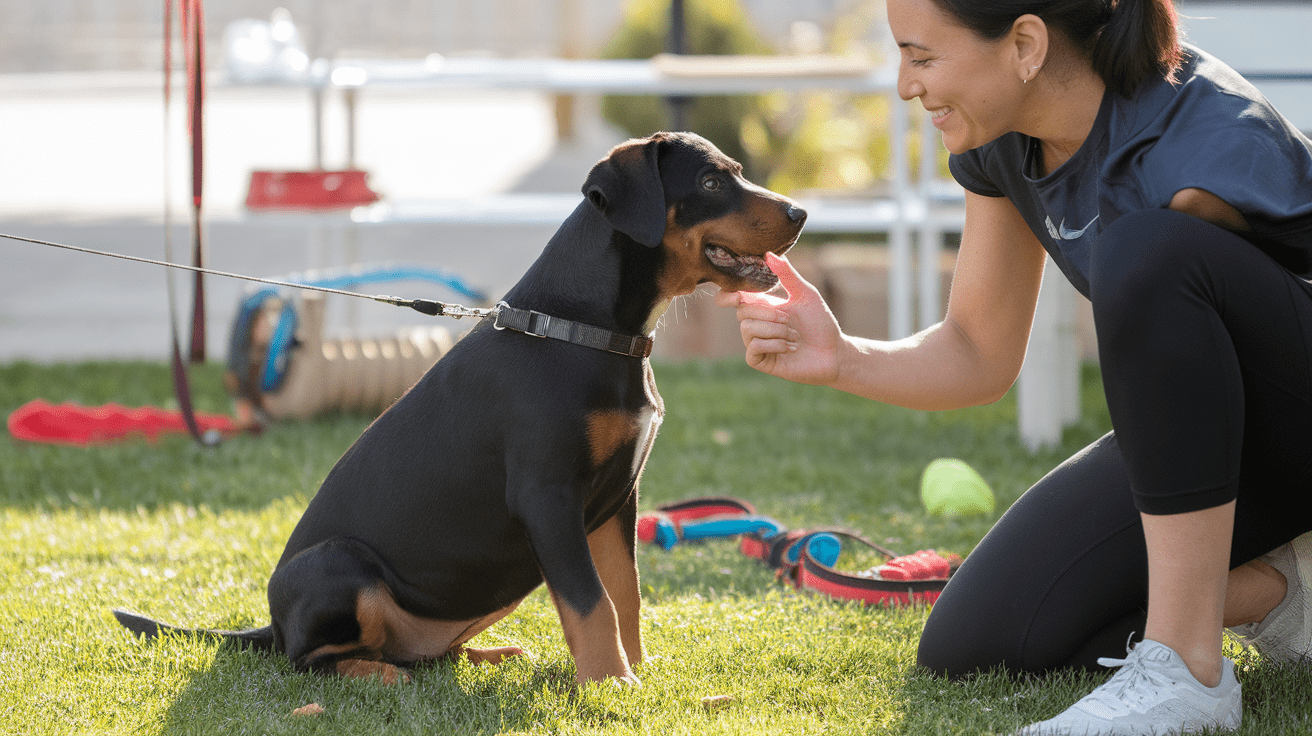
As someone who’s trained numerous Rottweiler Hound mixes, I can tell you that early training is absolutely crucial. According to a study in the Journal of Veterinary Behavior, dogs who receive structured training before 16 weeks of age show significantly fewer behavioral problems later in life. Think of training these intelligent hybrids like teaching a gifted child – they have the capacity to learn quickly, but they need consistent guidance and clear boundaries.
Early Training Tips
I’ve found that Rottweiler Hound mixes respond best to positive reinforcement training. From my experience with a mix named Scout, these dogs thrive when training is treated like a fun partnership rather than a strict discipline session. Essential early training should focus on:
• Basic obedience commands• Leash manners (crucial given their strength)
• Impulse control exercises
• Recall training (especially important due to their hound instincts)
Behavioral Challenges
In my practice, I’ve noticed these mixes can present unique challenges that combine both parent breeds’ traits:
• Strong prey drive from the hound lineage• Protective instincts from the Rottweiler side
• Potential stubbornness during training
• Tendency to follow scents if not properly trained
I remember working with a Rottweiler-Beagle mix who would constantly track scents during walks. We solved this by creating a “switch command” that signaled when it was okay to sniff and when to focus on walking. It’s like having a toggle switch between their working mode and free time.
Socialization Requirements
Proper socialization is like building a strong foundation for a house – without it, everything else becomes unstable. These dogs need extensive exposure to:
• Different people (ages, sizes, ethnicities)• Various environments and surfaces
• Other animals and dogs
• Different sounds and situations
I always tell my clients to think of socialization as their puppy’s education about the world. Just like we wouldn’t want a child to only experience one type of situation, these intelligent dogs need diverse experiences to become well-rounded adults. Remember, a well-socialized Rottweiler Hound mix is more likely to become the confident, stable companion you’re hoping for.
Living with a Rottweiler Hound Mix
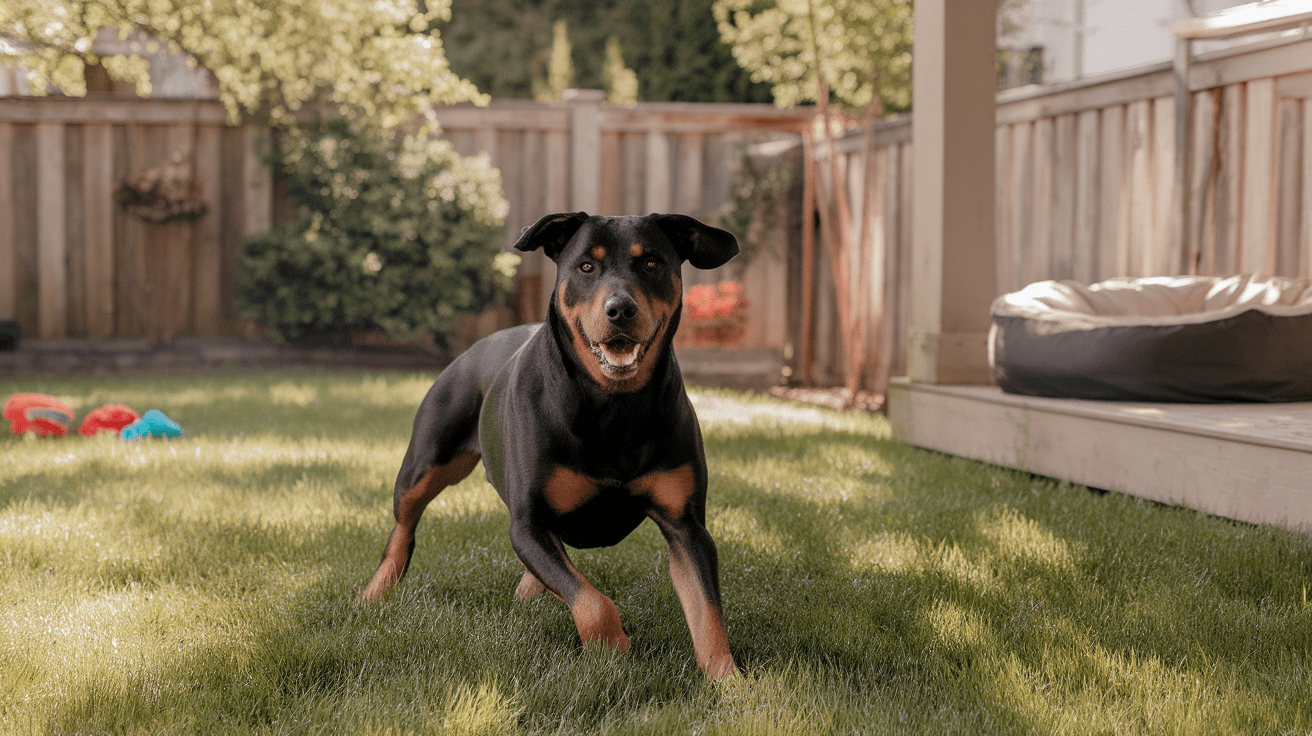
Living with a Rottweiler Hound mix is like having a gentle giant who’s also an expert detective. Based on my years of experience treating these hybrids, I can tell you they adapt well to family life when their needs are properly met. According to a study by the Journal of Applied Animal Welfare Science, dogs with sufficient living space and family interaction show significantly lower stress levels and behavioral issues.
Space Requirements
These powerful hybrids need adequate space to thrive. In my practice, I’ve observed that successful Rottweiler Hound mix owners typically provide:
• A fenced yard of at least 1/4 acre• Dedicated indoor rest areas
• Separate feeding and water stations
• Safe spaces for retreat when needed
I remember consulting with a family living in a small apartment with their Rottweiler-Basset mix. We created a strategic exercise schedule and indoor enrichment plan to compensate for the limited space. While they made it work, these dogs generally do better with more room to move.
Family Compatibility
These dogs are typically excellent family companions when properly trained. They tend to be:
• Protective yet gentle with children• Loyal to their entire family unit
• Patient with supervised interactions
• Adaptable to family routines
Think of them as a combination of a watchful guardian and a playful family member. However, due to their size and strength, I always recommend supervision with young children and teaching proper interaction techniques to all family members.
Other Pet Interactions
When it comes to other pets, early socialization is key. In my experience, these mixes can learn to live harmoniously with other animals if introduced properly. Consider:
• Gradual introductions to existing pets• Monitoring prey drive around smaller animals
• Establishing clear boundaries and spaces
• Regular positive reinforcement for good interactions
I once worked with a family whose Rottweiler-Bloodhound mix successfully integrated with their two cats. The key was patience and creating positive associations. Like teaching children to share toys, these dogs need to learn how to share their space and family’s attention with other pets.
Adopting a Rottweiler Hound Mix
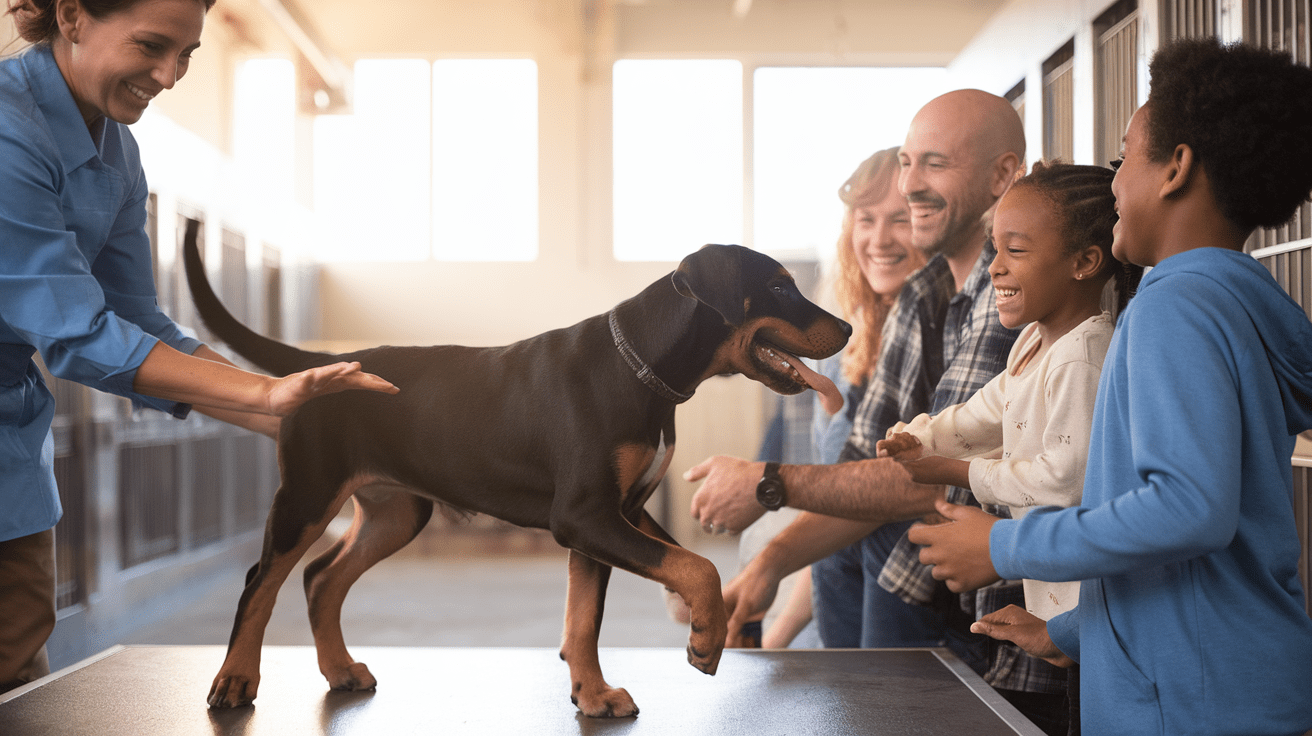
As a veterinarian who’s guided numerous families through the adoption process, I can tell you that bringing home a Rottweiler Hound mix requires careful consideration. According to the ASPCA’s pet statistics, mixed-breed dogs make up approximately 53% of dogs in shelters, making adoption a meaningful choice.
Where to Find This Mixed Breed
In my experience, potential owners can find Rottweiler Hound mixes through several channels:
• Breed-specific rescue organizations• Local animal shelters
• Reputable mixed-breed breeders
• Rottweiler rescue groups that accept mixes
I remember helping a family find their perfect match through a local rescue. Like finding a perfect puzzle piece, it took time and patience, but the result was worth the wait. They found a wonderful Rottweiler-Coonhound mix who became an integral part of their family.
Cost Considerations
When adopting a Rottweiler Hound mix, consider both initial and long-term costs:
• Adoption fees ($200-500)• Initial medical expenses (vaccines, spay/neuter)
• Quality food ($60-100 monthly)
• Regular veterinary care ($500-1000 annually)
• Training classes ($50-150 per session)
Think of it like planning for a child’s education – you need to consider both immediate and future expenses. From my clinic experience, I’ve seen that being financially prepared helps ensure better care decisions throughout your dog’s life.
Questions to Ask Breeders
Whether working with a rescue or breeder, ask these essential questions:
• Can I meet both parent dogs? (if possible)• What health tests have been performed?
• What’s the temperament history of the parents?
• What socialization has the puppy received?
• Are there any known health issues in the lineage?
I always tell potential adopters to trust their instincts. Like a job interview, if something feels off about the situation or the answers seem evasive, it’s better to wait for the right match. Remember, adopting a Rottweiler Hound mix is a long-term commitment, typically 10-12 years, so taking time to make the right choice is crucial for both you and your future furry family member.
Frequently Asked Questions About Rottweiler Hound Mixes
Conclusion
The Rottweiler Hound mix represents a fascinating combination of strength, intelligence, and tracking ability. As a veterinarian, I’ve seen these hybrids thrive in homes where their physical and mental needs are met with dedication and understanding. While they require significant commitment in terms of training, exercise, and socialization, they reward their families with unwavering loyalty and companionship. Remember that each Rottweiler Hound mix is unique, inheriting different traits from their parent breeds. Success with these dogs comes down to providing consistent training, adequate space, and plenty of love. If you’re ready for an active, intelligent, and devoted companion and can commit to meeting their needs, a Rottweiler Hound mix could be your perfect match. The key is understanding that you’re not just getting a pet – you’re gaining a dedicated family member who will enrich your life for years to come.
To better understand the Rottweiler side of this mix, I highly recommend reading our in-depth Rottweiler Breed Guide: 101 Amazing Facts. This comprehensive resource explores everything from the breed’s fascinating history to essential care tips, helping you understand how these remarkable traits influence your mixed breed companion. Understanding the Rottweiler’s core characteristics is crucial for successfully raising a Rottweiler Hound mix, as many of these traits will be present in your hybrid dog.


